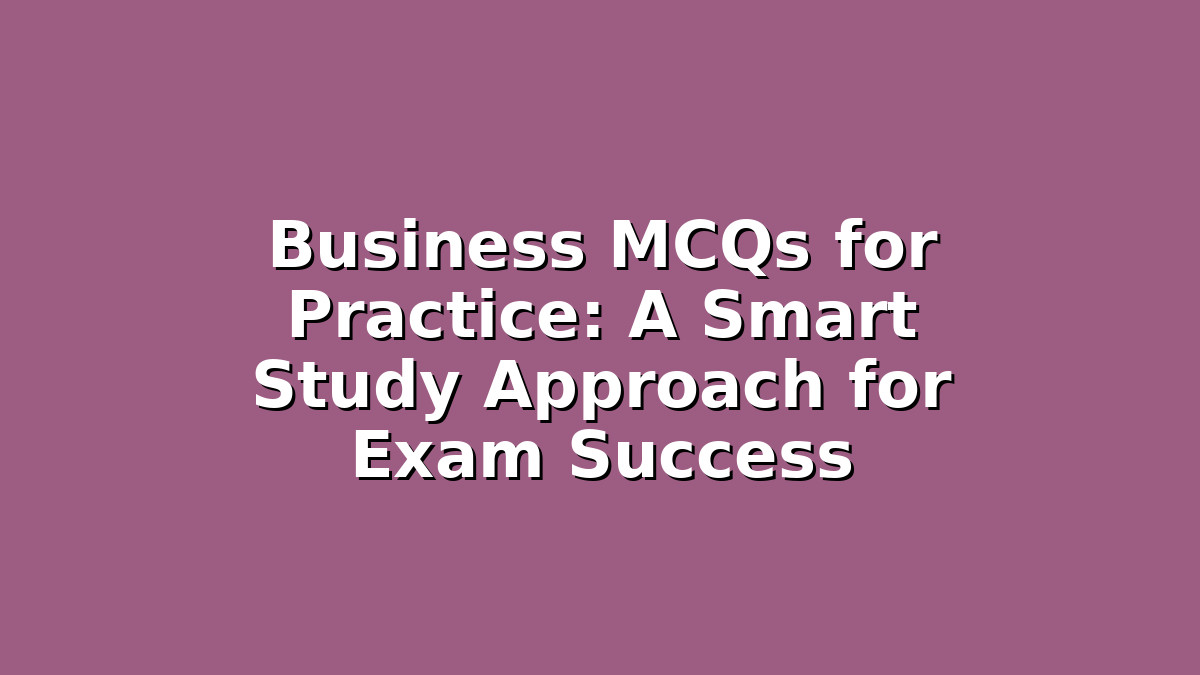Preparing for business exams can be both exciting and challenging. Whether you are studying for your high school business class, a college-level course, or professional certification, mastering key concepts is essential. One effective way to reinforce your knowledge and improve exam performance is by practicing Business Multiple Choice Questions (MCQs). This article will guide you through the importance of Business MCQs, tips to use them effectively, and how to integrate them into your study routine for maximum results.
Why Practice Business MCQs?
Multiple Choice Questions are a common format used in business exams worldwide. They test your understanding of various topics like marketing, finance, management, economics, and entrepreneurship. Practicing Business MCQs helps you:
– Enhance Recall and Retention: MCQs force you to think quickly and remember facts, theories, and formulas.
– Identify Knowledge Gaps: Regular practice reveals areas where your understanding is weak.
– Improve Time Management: MCQ practice allows you to simulate exam conditions, helping you manage pacing.
– Build Confidence: Familiarity with question types and formats reduces exam anxiety.
With these benefits in mind, let’s explore how you can use Business MCQs to boost your study efficiency.
1. Select Quality Business MCQs Tailored to Your Exam Level
Not all MCQs are created equal. The first step to successful practice is choosing questions that match your course syllabus and difficulty level. Here’s how to find the best Business MCQs:
– Use Reputable Study Materials: Look for textbooks, online platforms, or apps that offer well-structured question banks. Some popular resources include online educational sites like Khan Academy, Quizlet, or specialized business exam prep websites.
– Focus on Your Exam Board or Curriculum: Different exams (CBSE, IB, ACCA, CMA, etc.) may have varying emphasis on topics. Make sure the MCQs cover the syllabus and question patterns you will face.
– Mix Conceptual and Application-Based Questions: Business studies combine theory with real-world application. Choose MCQs that test both your understanding of concepts and your ability to apply them in scenarios.
– Check for Explanations: Quality MCQs often come with detailed answer explanations. These are invaluable for learning from mistakes and deepening your comprehension.
By selecting the right questions, you ensure that your practice is targeted and effective, reducing wasted study time.
2. Develop a Consistent Practice Routine with Active Learning Techniques
Consistency is key to mastering business concepts through MCQs. Here are some tips to make your practice sessions productive:
– Set a Regular Schedule: Dedicate fixed times each day or week for MCQ practice. Even 20-30 minutes daily can make a big difference.
– Simulate Exam Conditions: Time yourself while answering MCQs to mimic the pressure of the actual test. This helps build stamina and improves your speed.
– Practice in Small Batches: Break your study sessions into manageable sets of 10-20 questions. This prevents fatigue and keeps focus sharp.
– Use the Process of Elimination: When unsure, eliminate obviously wrong options first to improve your chances of selecting the right answer.
– Review Answers Thoroughly: Don’t just mark correct or incorrect—understand why an answer is right or wrong. Revisit the related theory if needed.
– Mix Topics: Rotate between different business topics during practice to keep your mind engaged and improve overall retention.
Active learning through MCQs encourages critical thinking and helps you retain information longer, compared to passive reading or note-taking alone.
3. Combine MCQ Practice with Other Study Strategies for Holistic Preparation
While Business MCQs are powerful, combining them with other study methods maximizes your exam readiness. Consider integrating these techniques:
– Summarize Key Concepts: After practicing MCQs on a topic, write brief notes or mind maps summarizing important theories and formulas. This reinforces your understanding.
– Group Study: Collaborate with classmates to discuss challenging MCQs. Explaining answers to others can deepen your grasp and reveal new insights.
– Use Flashcards: Create flashcards featuring important terms, definitions, and concepts. Use them alongside MCQs for quick revision.
– Watch Video Tutorials: For complicated topics, video lessons can offer visual explanations that complement your MCQ practice.
– Take Full-Length Mock Tests: Periodically, attempt full-length practice exams under timed conditions. This builds endurance and helps apply MCQ skills in a comprehensive setting.
– Seek Feedback: If possible, consult teachers or mentors to clarify doubts arising from MCQ practice.
Combining MCQs with varied study methods promotes balanced learning and confidence, preparing you well for any business exam.
Conclusion
Business MCQs are a valuable tool for students aiming to excel in their exams. By selecting quality questions aligned with your syllabus, establishing a consistent and active practice routine, and integrating other study techniques, you can strengthen your knowledge and exam skills effectively. Remember, persistence and smart practice are your best allies. Embrace Business MCQs as part of your study plan, and watch your confidence and results soar!
Keep practicing, stay positive, and believe in your ability to succeed. Good luck with your business exam preparation!

Responses